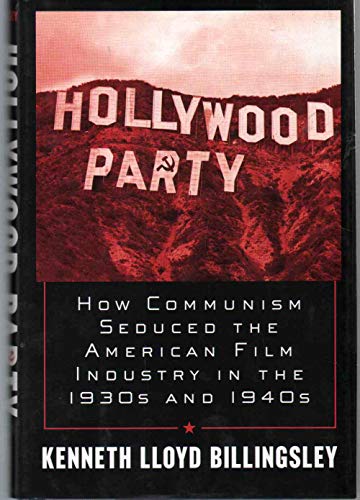Hollywood Party: How Communism Seduced the American Film Industry in the 1930s and 1940s
Kenneth Lloyd Billingsley
About the Book
Description:
Connecting readers with great books since 1972! Used books may not include companion materials, and may have some shelf wear or limited writing. We ship orders daily and Customer Service is our top priority!. Seller Inventory # S_348888730
About this title:
Synopsis: In the fall of 1997 some of the biggest names in show business filled the Motion Picture Academy theater in Beverly Hills for Hollywood Remembers the Blacklist, a lavish production worthy of an Oscar telecast. In song, film, and live performances by stars such as Billy Crystal, Kevin Spacey, and John Lithgow, the audience relived a time some fifty years before, when, as the story has always been told, courageous writers and actors stood firm against a witch-hunt and blacklist that wrecked lives and destroyed careers. Left untold that night, and ignored in books and films for more than half a century, was a story not so politically correct but vastly more complex and dramatic.
In Hollywood Party the complete story finally emerges, backdropped by the great upheavals of our time and with all the elements of a thriller—wrenching plot twists, intrigue, betrayal, violence, corruption, misguided passion, and lost idealism. Using long neglected information from public records, the personal files of key players, and recent revelations from Soviet archives, Kenneth Lloyd Billingsley uncovers the Communist Party's strategic plan for taking control of the movie industry during its golden age, a plan that came perilously close to success. He shows how the Party dominated the politics of the movie industry during the 1930s and 1940s, raising vast sums of money from unwitting liberals and conscripting industry luminaries into supporting Stalinist causes.
In riveting detail, the shameful truth unfolds: Communist writers, actors, and directors, wealthy beyond the dreams of most Americans, posture as proletarian wage slaves as they try to influence the content of movies. From the days of the Popular Front through the Nazi-Soviet Pact and beyond World War II, they remain faithful to a regime whose brutality rivaled that of Hitler's Nazis.
Their plans for control of the industry a shambles by the mid-1950s, the Party nonetheless succeeded in shaping the popular memory of those days. By chronicling what has been left on the cutting-room floor, from "back story" to aftermath, Hollywood Party changes those perceptions forever.
"Mr. Billingsley's book is the best exploration I've seen of the Hollywood blacklist and the Communist Party's role in that conflict. Hollywood Party covers it all with insight, meticulous research, and some wry perceptions."
—Charlton Heston
"For years we've been treated to the left-wing version of the Hollywood blacklist. Now Lloyd Billingsley has provided us with the rest of the story."
—David Horowitz, author of Radical Son
"Now the whole story can be told; the blacklist was never black and white after all, but can only be depicted accurately in shades of gray. From this day forward, no future backstage history of Hollywood can be called complete without taking into account the evidence that Lloyd Billingsley has uncovered."
—Gary McVey, film curator, former director of the Los Angeles International Film Festival
"Hollywood Party is an absolutely captivating achievement."
—Richard Grenier, columnist and author of Capturing the Culture
About the Author
Kenneth Lloyd Billingsley is the editorial director of the Pacific Research Institute in San Francisco. He has served as California correspondent for the Spectator (London) and written for the Washington Post, Wall Street Journal, Los Angeles Daily News, San Francisco Chronicle, and many other publications. He currently divides his time between Sacramento, the Bay Area, and Southern California.
Review: Here's what most people know about the clash between Washington, D.C., and Hollywood involving Communist influence over the film industry: the House Committee on Un-American Activities led an organized witch hunt against writers and actors with left-wing sympathies, creating an environment that led to a blacklist destroying many talented people's careers. But some insist this isn't the whole story. "It's a false parallel. Witch hunt!" wrote Molly Kazan, whose husband Elia testified before the committee, saved his career as a film director, and earned enmity from Hollywood liberals continuing to the present day. "The phrase would indicate that there are no Communists in the government, none in the big trade unions, none in the press, none in the arts.... No one who was in the Party and the left uses that phrase. They know better."
Kenneth Lloyd Billingsley works to fill in some of the historical gaps with Hollywood Party. The information on the role of Communist (and Communist- sympathetic) screenwriters is not particularly revelatory to those familiar with the basic outlines of the story, although Billingsley pushes the Communist angle hard, noting the Party's lockstep support of Stalin and what might charitably be called his "policies," as well as the vicious backlash against any leftist who spoke out against the Communists. His chronicle of Communist efforts to control the studio workers' unions, however, illuminates a less glamorous but perhaps more substantial aspect of the story. Those in search of celebrity dirt will be mildly disappointed; there are several star-studded scenes, but mostly mild anecdotes on the level of Ronald Reagan's gradual realization that, as an SAG activist, he was being played for a dupe by the Reds. Unless, that is, Billingsley is writing about a Communist or a fellow traveler, in which case no personal quirk, from screenwriter Dalton Trumbo's penchant for working in his bathtub to Bertolt Brecht's lack of hygiene to left-wing journalist Ella Winter's mannishly short hair, is overlooked. -- Ron Hogan
Bibliographic Details
Title: Hollywood Party: How Communism Seduced the ...
Publisher: Prima Publishing
Publication Date: 1998
Binding: Hardcover
Condition: Very Good
